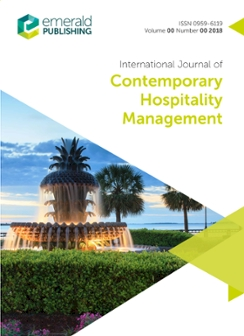Table of contents
Radicalization and attenuation in the construction of tourism employment images: a multi-level frame analysis
Andreas Mölk, Manfred Auer, Mike PetersTourism employment is very diverse ranging from precarious, exploitative study to high-quality workplaces. However, poor employment images dominate the tourism industry, which…
Reference effects and customer engagement in a museum visit
Noel Yee Man Siu, Tracy Junfeng Zhang, Ho Yan KwanBy extending the expectancy-disconfirmation theory and integrating the elaboration likelihood model, this study aims to explore the reference effects (i.e. disconfirmation and…
The effects of on-the-job embeddedness and its sub-dimensions on small-sized hotel employees’ organizational commitment, work engagement and turnover intentions
Emmanuel Twumasi Ampofo, Osman M. KaratepeThis paper aims to examine the impacts of links, fit and sacrifice as the sub-dimensions of on-the-job embeddedness (JE) on turnover intentions through the mediating roles of…
What helps or hinders the emotional intelligence practice? A study of Vietnamese hotel workers
Quynh Nguyen, Adele Ladkin, Hanaa OsmanDrawing from emotional labour (EL) and emotion regulation (ER) theories, this paper aims to identifiy what helps and what hinders the emotional intelligence (EI) practice of…
Who is an evangelist? Food tourists’ positive and negative eWOM behavior
Jin-young Kim, Johye HwangThis study aims to examine food tourists’ engagement in positive and negative electronic word-of-mouth (eWOM) by considering the following questions: Do satisfied customers engage…
Leader knowledge hiding, feedback avoidance and hotel employee outcomes: a moderated mediation model
Muhammad Waheed Akhtar, Osman M. Karatepe, Fauzia Syed, Mudassir HusnainThe purpose of this paper is to develop and test a research model that investigates feedback avoidance behavior (FAB) as a mediator of the impact of leader knowledge hiding (LKH…
The moderating role of mobile promotion during current and subsequent purchasing occasions: the case of restaurant delivery services
Huifeng Pan, Hong-Youl HaThis study aims to explore the moderating outcomes of mobile promotions in three parts. First, Study 1 is conducted to discover the moderating effect of mobile promotions when…
A critical review of smart hospitality and tourism research
Rob Law, Huiyue Ye, Irene Cheng Chu ChanThis study aims to build a comprehensive knowledge structure of smart hospitality and tourism research.
Mediating mechanisms in the relationship between supervisor incivility and employee service delivery in the hospitality industry
Angie Yeonsook Im, Seonghee ChoThis study aims to investigate the influence of supervisor incivility on employees’ general self-efficacy and engagement and their mediating roles in a relationship between…
Value cocreation research in tourism and hospitality: a comparative bibliometric analysis
Xinyi Liu, Ying Zeng, Juan He, Zhiyong LiThe purpose of this study is to present a holistic review of journal articles on value cocreation in the tourism and hospitality field. By distinguishing similarities and…
Convex-concave effect of financial flexibility on hospitality performance: quantile regression approach
Bao-Guang Chang, Kun-Shan WuThe purpose of this paper is to study the influence of financial flexibility (FF) on enterprise performance (EP) within Taiwan’s hospitality industry during the COVID-19 shock and…
An exploratory study of US craft brewery owners’ motivations for adopting environmental practices
Erol Sozen, Martin O’Neill, Imran RahmanCraft brewers in the USA have long sought to improve the efficiency of beer production to achieve their primary aims of improving the product and increasing profit margins. More…
Changes in the effect of credence cues on restaurant delivery service under different health risks
Jewoo Kim, Jaewook Kim, Yiqi WangDue to increased health concerns, restaurant customers rely more on credible cues that indirectly represent health-related credence quality. To comprehensively understand the…
Family supportive and singles-friendly: how an equally supportive working environment impacts unmarried hotel employees
Su-Ying Pan, Yuquan LiThis study aims to focus on a relatively unexplored area: single employees’ non-work needs. With social information processing theory as the basis, the authors examine the process…
Fun at workplace and intention to leave: role of work engagement and group cohesion
Jeevan Jyoti, DimpleThe purpose of this study is to examine the role of work engagement (WE) and group cohesion (GC) in the context of fun at workplace (FAW) and its outcomes.
Group diversity and employee service innovative behavior in the hospitality industry: a multilevel model
Mingjun Yang, Tuan Trong Luu, David QianService innovative behavior from employees helps hospitality organizations gain a competitive advantage and sustain business flourishment. Although group diversity has been…
Key factors driving customers’ restaurant dining behavior during the COVID-19 pandemic
Miyoung Jeong, Kawon Kim, Forest Ma, Robin DiPietroThis study aims to identify key factors that affected US respondents’ dining behavior at restaurants during the midst of the COVID-19 pandemic.

ISSN:
0959-6119Online date, start – end:
1989Copyright Holder:
Emerald Publishing LimitedOpen Access:
hybridEditor:
- Prof Fevzi Okumus